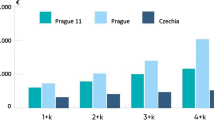Abstract
The paper describes the transformation of the territory of New Moscow that occurs as a result of incorporation to the capital. The main focus is on the construction of housing as the main factor in transformation. The reasons of the difference between the real transformation processes and declared goals of the incorporation of new territories are defined. The impact of different forces on the development of the territory is analyzed including legislative initiatives and administrative decisions of the federal and regional authorities, requirements of spatial planning agencies, and business interests.
Similar content being viewed by others
References
Glazychev, V.L., Urbanistika (Urbanistics), Moscow: Evropa, 2008.
Glazychev, V.L., Gorod bez granits (The City without Borders), Moscow: Territoriya Budushchego, 2011.
Lyubovnyi, V.Ya. and Sdobnov, Yu.A., Moskva i stolichni region: problemy regulirovaniya sotsial’no-ekonomicheskogo i prostranstvennogo razvitiya (Moscow and Capital Region: Problems of the Regulation of Socio-Economic and Spatial Development), Moscow: Ekon-Inform, 2011.
Makhrova, A.G., Nefedova, T.G., and Treivish, A.I., Moskovskaya oblast’ segodnya i zavtra (Moscow Oblast Today and Tomorrow), Moscow: Novyi Khronograf, 2008.
Polterovich, V.M., Elementy teorii reform (Elements of the Theory of Reforms), Moscow: Ekonomika, 2007.
Golubchikov, O., Phelps, N., and Makhrova, A., From closed city to edge city? Governing growth at the periphery of Moscow — the case of Khimki, in International Perspectives on Suburbanization: A Post-Suburban World? Phelps, N. and Wu, F., Eds., Palgrave-Mac-Millan, 2011, pp. 177–191.
Federal State Statistic Service. http://www.gks.ru. Cited December 2, 2013.
Department of development of new areas of Moscow. http://www.drnt.mos.ru. Cited December 23, 2013.
Information portal on estate RealEstate. http://www.realestate.ru. Cited January 26, 2014.
Independent land portal Zemer.ru. http://www.zemer.ru. Cited December 26, 2013.
Analytical Center “Indicators of real estate market.” http://www.irn.ru. Cited December 14, 2013.
Lappo, G.M., A concept of supporting framework for territorial economic structure: development, theoretical and practical significance, Izv. Akad. Nauk SSSR, Geogr., 1983, no. 5, pp. 16–28.
Moscow Department of Labor and Employment. http://trud.mos.ru. Cited December 16, 2013.
Metrium Group Consultancy. http://www.metrium.ru/news/detail/16769. Cited January 16, 2014.
Makhrova, A.G., Nefedova, T.G., and Treivish, A.I., Spatial trends of socio-economic development of Moscow agglomeration, Territ. Plann., 2012, no. 4 (40), pp. 18–32.
Jacobs, J., The Economy of Cities, London: Jonathan Cape, 1970.
Trutnev, E.K., Is New Moscow out of law? Proekt Rossiya, 2013, no. 67.
Maclennan, D. and O’Sullivan, A., Localism, devolution and housing policies, Hous. Stud., 2013, p. 1–17.
Housing policy — a fundamental review, the Institute for Public Policy Research (IPPR), 2011. http://www.ippr.org. Cited November 23, 2013.
Zhu, J., Governance over land development during rapid urbanization under institutional uncertainty, with reference to periurbanization in Guangzhou metropolitan region, China, Environ. Plan. C: Gov. Policy, 2013, vol. 31, no. 2, pp. 257–275.
Fujita, M., Krugman, P., and Venables, A.J., The Spatial Economy: Cities, Regions, and International Trade, Cambridge, Massachusetts: MIT Press, 1999.
Author information
Authors and Affiliations
Corresponding author
Additional information
Original Russian Text © E.K. Kuricheva, 2014, published in Regional’nye Issledovaniya, 2014, No. 1, pp. 50–61.
Rights and permissions
About this article
Cite this article
Kuricheva, E.K. Territorial transformation of New Moscow under the influence of housing construction. Reg. Res. Russ. 4, 220–230 (2014). https://doi.org/10.1134/S2079970514040145
Received:
Published:
Issue Date:
DOI: https://doi.org/10.1134/S2079970514040145




